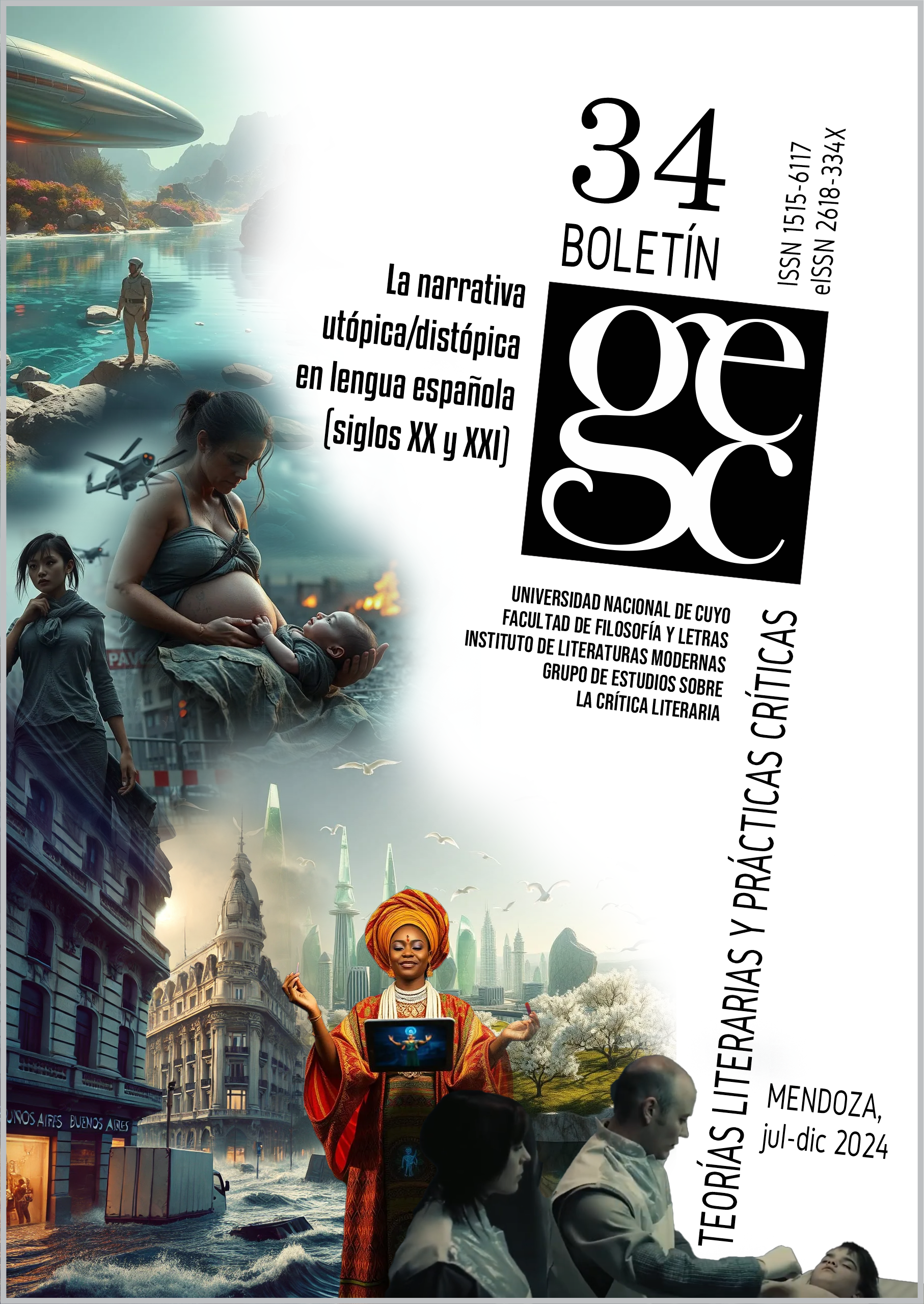Our Reason and Our Fantasy: Utopia and Dystopia in Three Works by Angélica Gorodischer
DOI:
https://doi.org/10.48162/rev.43.070Keywords:
utopia, critical dystopia, feminisms, science fiction, territoriesAbstract
This article analyzes Opus dos (1967), Bajo las jubeas en flor (1973), and Las repúblicas (1991) by Angélica Gorodischer through the lenses of utopia and dystopia, taking into account recent developments in critical debates surrounding these concepts. I argue that this segment of the author’s literary work is part of a growing field that involves science fiction, the imagination of the future, and feminist imaginaries within Argentina and Latin America in large. In this regard, the investigation seeks to establish analytical frameworks that reflect this participation, as well as the need to deepen the examination of both Gorodischer’s work and the imaginaries proposed in 20th-century Argentine literature.
References
Bellesi, D. (1981). Entrevista. Entrevista a Ursula K. Le Guin. El péndulo II, (3), 53-61. https://ahira.com.ar/ejemplares/el-pendulo-ii-03/
Butler, J. (1982). Variations on Sex and Gender: Beauvoir, Wittig, and Foucault. En Ş. Benhabib y D. Cornell (Eds.), Feminism As Critique: On the Politics of Gender (pp. 128-142). University Of Minnesota Press.
Butler, J. (1990). Gender trouble: Feminism and the subversion of identity. Routledge.
Cisternas Rossel, E. (2012). Opus dos, anticipando el fin y la reconstrucción del orden. Revista Herencia, (3), 65-77. https://dialnet.unirioja.es/servlet/articulo?codigo=3999080
Curri, A (Directora). (2018). Worlds of Ursula K. Le Guin [Película]. The Center for Independent Documentary.
Gorodischer, A. (1967). Opus 2. Minotauro.
Gorodischer, A.(1973). Bajo las jubeas en flor. Ediciones de la Flor.
Gorodischer, A. (prólogo de Gandolfo, E.). (1977). Casta luna electrónica. Andrómeda
Gorodischer, A. (1991). Las repúblicas. Ediciones de la Flor.
Gorodischer, A. (2018). Kalpa Imperial. Emecé.
Gorodischer, A. (2006). Trafalgar. Emecé.
Haraway, D. (1995). Ciencia, cyborgs y mujeres: La reinvención de la naturaleza. Cátedra.
Hollinger, V. (2003). Feminist theory and science fiction. En E. James y F. Mendlesohn (Eds.), The Cambridge Companion to Science Fiction (pp. 125-136). Cambridge University Press. https://doi.org/10.1017/CCOL0521816262.009
Kurlat Ares, S. (2018). La Ilusión Persistente: Diálogos entre la ciencia-ficción y el campo cultural. Instituto Internacional de Literatura Iberoamericana.
Kurlat Ares, S. y De Rosso, E. (Eds.). (2021). La ciencia ficción en América latina: Crítica. Teoría. Historia. Peter Lang.
Maradei, G. (2020). Contiendas en torno al canon: Las historias de la literatura argentina posdictadura. Corregidor.
Martorell Campos, F. (2021). Nueve tesis introductorias sobre la distopía. Quaderns de Filosofia, 7(2), 11-33. https://doi.org/10.7203/qfia.7.2.20287
Urraca, B. (1995). Angelica Gorodischer’s Voyages of Discovery: Sexuality and Historical Allegory in Science-Fiction’s Cross-Cultural Encounters. Latin American Literary Review, 23(45), 85-102. http://www.jstor.org/stable/20119697
Romero, I. (2018,8 de febrero). La mano izquierda de Borges. Radar. https://www.pagina12.com.ar/93274-la-mano-izquierda-de-borges
Yannopoulos. A. (2018, 6 de junio). La transgresión de género en las primeras obras de Angélica Gorodischer, un ideosema clave para la lectura de los textos. Babel [Online], (37). https://doi.org/10.4000/babel.5126R
Villanueva Mir, M. (2018). De la isla a la frontera. La problematización del espacio en la ficción distópica contemporánea. Tropelías: Revista De Teoría De La Literatura Y Literatura Comparada, (29), 506-521. https://doi.org/10.26754/ojs_tropelias/tropelias.2018292083
Wittig, M. (2006). El pensamiento heterosexual y otros ensayos. Egales.
Downloads
Published
How to Cite
Issue
Section
License
Copyright (c) 2024 Michelle Arturi

This work is licensed under a Creative Commons Attribution-NonCommercial-NoDerivatives 4.0 International License.
Aquellos autores/as que tengan publicaciones en esta revista, aceptan los términos siguientes:
- Los autores/as conservarán sus derechos de autor y garantizarán a la revista el derecho de primera publicación de su obra, el cual estará simultáneamente sujeto a la Licencia de reconocimiento de Creative Commons que permite a terceros compartir la obra siempre que no se use para fines comerciales, siempre que se indique su autor y su primera publicación en esta revista, y siempre que se mencionen la existencia y las especificaciones de esta licencia de uso.
- Los autores/as podrán adoptar otros acuerdos de licencia no exclusiva de distribución de la versión de la obra publicada (p. ej.: depositarla en un archivo telemático institucional o publicarla en un volumen monográfico) siempre que se indique la publicación inicial en esta revista y se cumplan las otras condiciones mencionadas arriba.
- Se permite y recomienda a los autores/as difundir su obra a través de Internet (p. ej.: en archivos telemáticos institucionales o en su página web) antes y durante el proceso de envío, lo cual puede producir intercambios interesantes y aumentar las citas de la obra publicada. (Véase El efecto del acceso abierto).














